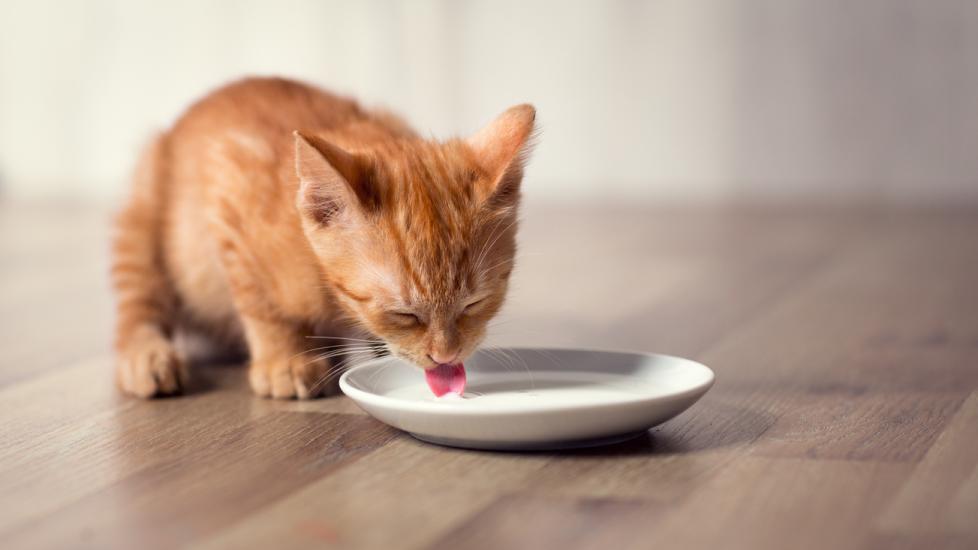Can Cats Drink Milk?
Every morning, your cat is there and waiting for you to pour milk onto your cereal, hoping that you might spill a drop or two. Clearly, the taste of milk is very attractive for many cats, leading you to wonder: Can cats drink milk? Will drinking milk make your cat sick? Is milk good for cats, or are cats lactose intolerant? Read on to learn the scoop on milk for cats.
Is Milk Good for Cats?
The simple answer is no. Cow’s milk isn’t good for cats, and for a number of reasons. The most glaring is that, as cats mature, they often lose the enzyme needed to properly break down milk. These cats are typically referred to as “lactose intolerant,” a condition that occurs in people as well.
When these cats consume milk, it causes a significant amount of gastrointestinal upset that can lead to:
-
Abdominal pain
But not all cats are lactose intolerant. So, can some cats drink milk? The answer is still no. Cow’s milk has quite a lot of fat in it, and many (perhaps even most) cats are prone to obesity. Allowing cats to drink milk on a regular basis simply adds fats and sugars into their diet, causing it to become unbalanced and making it more likely Fluffy will become overweight.
Much like everything dealing with diet, however, these guidelines are serving dependent. If your cat loves milk and is not lactose intolerant, a teaspoon of milk once or twice a week will not likely do any harm. But offering a larger amount—or offering it more frequently—could lead to long-term problems.
Is Your Cat Lactose Intolerant?
You may be wondering if your cat is lactose intolerant and if giving Fluffy milk might cause illness. Unfortunately, most cats do develop lactose intolerance as they mature. This results from cats producing less lactase, which is the enzyme that digests milk.
If there is no lactase, the undigested milk sugar lactose is allowed to pass through the intestinal tract—and as it travels, it pulls water into the intestines. This excessive amount of water can result in diarrhea. Additionally, bacteria in the colon consumes a large influx of sugars, resulting in gas. All of this can trigger vomiting, diarrhea, and an uncomfortable belly.
If your kitty is showing signs of vomiting, diarrhea, and gas within about 12 hours of eating a milk product, they are most likely lactose intolerant. Although most cases of lactose intolerance are self-limiting (meaning that they will resolve without treatment) it is possible for cats to become dehydrated and require veterinary care if the problem is severe or prolonged.
If your kitty is showing signs of vomiting, diarrhea, and gas within about 12 hours of eating a milk product, they are most likely lactose intolerant.
Most kitties will bounce back from mild lactose intolerance within about 24 hours. But if your kitty is feeling sick for longer than 24 hours, is vomiting to the point where they cannot keep down water, or is particularly lethargic, seek veterinary care.
Can Cats Drink Milk Alternatives?
Cow’s milk is off-limits, but can you share your favorite plant- or nut-based milk with your cat? Unfortunately, oat milks, soy milks, almond milks, and coconut milks are also not a good idea.
Some of these milks can:
-
Be high in fat and cause your cat to become overweight
-
Have sugars, oils, and thickeners that can be very hard to digest and lead to gastrointestinal upset
-
Contain additives and preservatives, which themselves are likely difficult for cats to digest
-
Have added salt content. A bit of salt isn’t necessarily bad for cats, but if your kitty is prone to hypertension or renal disease, it isn’t a good plan to add more to their diet.
Can Kittens Have Milk?
Kittens can happily drink milk (though, not cow’s milk!) with no signs of distress. This is because kittens are born with the full ability to process cat milk. As they wean and start eating food they will consume as adults, kittens start to lose the ability—and the enzymes—to process milk. This usually happens around 8 weeks of age.
That said, kittens are only able to drink milk produced by female cats—not milk from any other species such as cows, sheep, or goats. There are products that have been designed to mimic cat’s milk as closely as possible, such as PetAg KMR liquid milk supplement and PetAg KMR powder milk supplement. This is the only milk that should be fed to orphaned kittens or those needing additional supplementation. Even similar products made for dogs are not suitable for kittens, who have very specific nutritional needs.
Kittens are only able to drink milk produced by female cats—not milk from any other species such as cows, sheep, or goats.
What Can Cats Drink Instead of Milk?
Humans have so much variety in what we like to drink, but this isn’t the case with cats. Often prone to dehydration, cats benefit from lots of fresh water.
If you want to provide your kitty variety in what they drink, try offering water in different ways. For example, move water from a dripping faucet or water fountain in addition to their water bowl. If your cat likes cold water, add some ice to their bowl. Or, add several tablespoons of water to your cat’s canned food, making a soup of the meal.
If you make the water appealing enough, it can be just as special as milk—but with a lot more health benefits.
Featured Image: iStock/LuckyBusiness
